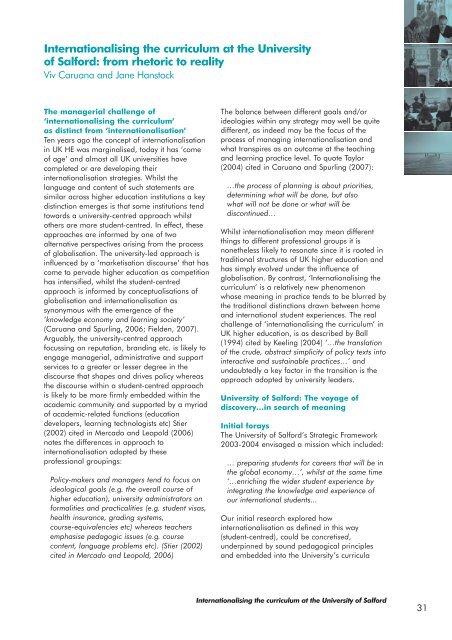HE senior mgrs_Apr18 - Bournemouth University
HE senior mgrs_Apr18 - Bournemouth University
HE senior mgrs_Apr18 - Bournemouth University
You also want an ePaper? Increase the reach of your titles
YUMPU automatically turns print PDFs into web optimized ePapers that Google loves.
Internationalising the curriculum at the <strong>University</strong>of Salford: from rhetoric to realityViv Caruana and Jane HanstockThe managerial challenge of‘internationalising the curriculum’as distinct from ‘internationalisation’Ten years ago the concept of internationalisationin UK <strong>HE</strong> was marginalised, today it has ‘comeof age’ and almost all UK universities havecompleted or are developing theirinternationalisation strategies. Whilst thelanguage and content of such statements aresimilar across higher education institutions a keydistinction emerges is that some institutions tendtowards a university-centred approach whilstothers are more student-centred. In effect, theseapproaches are informed by one of twoalternative perspectives arising from the processof globalisation. The university-led approach isinfluenced by a ‘marketisation discourse’ that hascome to pervade higher education as competitionhas intensified, whilst the student-centredapproach is informed by conceptualisations ofglobalisation and internationalisation assynonymous with the emergence of the‘knowledge economy and learning society’(Caruana and Spurling, 2006; Fielden, 2007).Arguably, the university-centred approachfocussing on reputation, branding etc. is likely toengage managerial, administrative and supportservices to a greater or lesser degree in thediscourse that shapes and drives policy whereasthe discourse within a student-centred approachis likely to be more firmly embedded within theacademic community and supported by a myriadof academic-related functions (educationdevelopers, learning technologists etc) Stier(2002) cited in Mercado and Leopold (2006)notes the differences in approach tointernationalisation adopted by theseprofessional groupings:Policy-makers and managers tend to focus onideological goals (e.g. the overall course ofhigher education), university administrators onformalities and practicalities (e.g. student visas,health insurance, grading systems,course-equivalencies etc) whereas teachersemphasise pedagogic issues (e.g. coursecontent, language problems etc). (Stier (2002)cited in Mercado and Leopold, 2006)The balance between different goals and/orideologies within any strategy may well be quitedifferent, as indeed may be the focus of theprocess of managing internationalisation andwhat transpires as an outcome at the teachingand learning practice level. To quote Taylor(2004) cited in Caruana and Spurling (2007):…the process of planning is about priorities,determining what will be done, but alsowhat will not be done or what will bediscontinued…Whilst internationalisation may mean differentthings to different professional groups it isnonetheless likely to resonate since it is rooted intraditional structures of UK higher education andhas simply evolved under the influence ofglobalisation. By contrast, ‘Internationalising thecurriculum’ is a relatively new phenomenonwhose meaning in practice tends to be blurred bythe traditional distinctions drawn between homeand international student experiences. The realchallenge of ‘internationalising the curriculum’ inUK higher education, is as described by Ball(1994) cited by Keeling (2004) ‘…the translationof the crude, abstract simplicity of policy texts intointeractive and sustainable practices…’ andundoubtedly a key factor in the transition is theapproach adopted by university leaders.<strong>University</strong> of Salford: The voyage ofdiscovery…in search of meaningInitial foraysThe <strong>University</strong> of Salford’s Strategic Framework2003-2004 envisaged a mission which included:… preparing students for careers that will be inthe global economy…’, whilst at the same time‘…enriching the wider student experience byintegrating the knowledge and experience ofour international students...Our initial research explored howinternationalisation as defined in this way(student-centred), could be concretised,underpinned by sound pedagogical principlesand embedded into the <strong>University</strong>’s curriculaInternationalising the curriculum at the <strong>University</strong> of Salford31





![[2012] UKUT 399 (TCC)](https://img.yumpu.com/51352289/1/184x260/2012-ukut-399-tcc.jpg?quality=85)




![Neutral Citation Number: [2009] EWHC 3198 (Ch) Case No: CH ...](https://img.yumpu.com/50120201/1/184x260/neutral-citation-number-2009-ewhc-3198-ch-case-no-ch-.jpg?quality=85)





